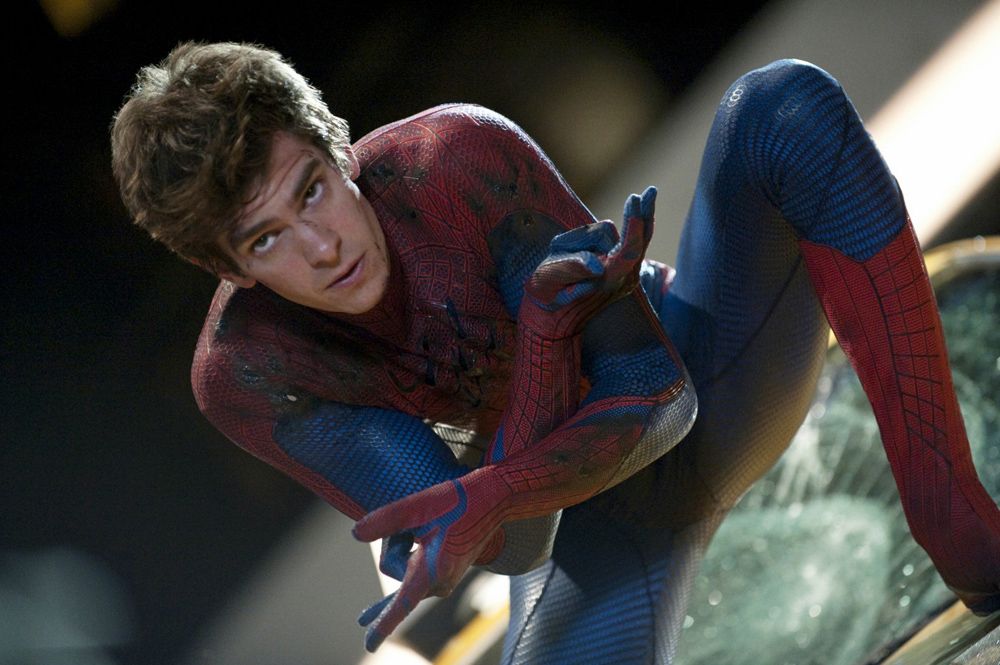The illusion of change is the usual approach to mainstream superhero comics. It offers the excitement of change without losing the successful elements to actual change. It's cynical but it's smart from a corporate standpoint. Every once in a while, however, actual change happens. Or maybe change is just talked about. Some like it, some don't like it. And then there are the people that really, really don't like it, and head down to their local torch-and-pitchfork store.
Such is where we find ourselves in the ongoing discussion of The Amazing Spider-Man star Andrew Garfield's hypothetical consideration of making Peter Parker bisexual.
But why did Garfield's idea trigger such heated responses? I'm not talking about the calm "Oh, I don't know, I'm not crazy about that idea, but rather the aggressive, threatening and hateful reactions that seem to come from a very dark place.
As with anything that generates heated, emotional reactions, there are a number of reasons. On one level, there is the rampant biphobia and homophobia, and America's general discomfort with sex and sexual issues. That's definitely present, but I think there's also another level at play for a segment of the reactors, something that pushes those phobias to the forefront as a defensive mechanism. Because what's really being threatened for a segment of fans is a strong identification with Spider-Man.
As Garfield eloquently expressed at Comic-Con International, the original concept of Spider-Man was that he represented the underdog. The unpopular and bookish nerd became the confident and clever superhero, even if life was never easy in either identity. That cathartic freedom and empowering persona juxtaposed with the shy outcast is one of the brilliant pieces of the character that made him so successful, and more importantly, so relatable.
Before the Internet made geeks king, probably hundreds of thousands of insecure and awkward pre-teens and teenagers stumbled through life without webbing and a mask to become charming and athletic. They felt isolated and alone because maybe they didn't know how to connect to others. Maybe their home life was too difficult. Maybe they had health problems growing up that kept them out of school too much. Maybe they just had different interests from everyone else. That loneliness is paralyzing. So finding a fictional character that embodies both what you are and what you want to be is extraordinarily powerful. That dual aspect in fictional characters can show up in a lot of places, but probably nowhere so pronounced as in superhero comics. And Spider-Man may be the most inspired example of this.
I can say all of this because the hypothetical "they" I mention above was me growing up. Finding the fictional character or characters that both reflected back myself and a better self helped me get through my formative years. At first they temporarily removed the loneliness, then they taught me how I might be able to speak up -- and, in time, how I could start finding the real me. By the time I graduated high school, I had gone from being painfully shy and introverted to extremely involved in theater and other groups. I was not conscious of any of this while going through it, but looking back, it's pretty obvious to me.
Of course, not everyone goes through some kind of personal transformation while reading superhero comics. But when there's a deeper connection to the character beyond a casual "Yeah, Spidey's kinda cool," there must be a personal reason.
That deeply personal reason, whether consciously recognized or not, creates an intimate bond with the character because it's so representative of them. So when that character is radically changed, on some level, it feels like a personal attack. Making Spider-Man bisexual isn't just changing a corporation's brand, it's modifying the personal avatar of thousands of children, teenagers and adults who have not yet grown beyond this bond. The personal identification might be taken away; that's scary. And as we know from nature shows, when an animal is threatened, and humans are animals, they either fight or run. The Internet gives a lot of them the courage to fight, regardless of how sloppy, messy, illogical and poorly thought out that fight may be. There's the disconnect of latching on to the very close-minded and bigoted arguments that their character/avatar has starkly opposed in so many stories. There's the proof that progressive reinventions of iconic characters are not only possible but refreshingly welcome. Garfield's idea and reasoning behind it is excellent, and just as there is room for a multiracial Spider-Man, there is room for a homosexual, bisexual or transgender Spider-Man, whether that be Peter Parker or someone else behind the mask. But facts, examples and reason are usually ignored when a person feels threatened.
A lot of people have the good judgment to suppress those urges to fight. They'll take a step back, get some perspective, personally mourn the loss and move on. Or maybe they'll write a letter or post online somewhere while maintaining some level of human decency. But a percentage have that disconnect where they impulsively and obsessively attack using whatever ugly or hurtful thing think can think to throw at the person who is changing or talking about changing their personal representation. Or they write death threats. However they act, it is without realization of how antithetical to the very character they so hold dear and they don't see it because the perceived threat feels so great.
This is not meant as a justification or defense of the hateful statements that invariably end up in the comment threads or on Twitter, or Google knows where else. They are categorically hateful, shameful, embarrassing and selfish. They are ultimately driven by fear, and fear of change is inevitable. Fortunately, despite efforts to maintain the illusion of change, actual change in whatever form it takes is also inevitable.

